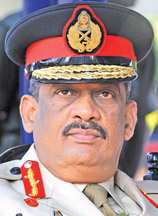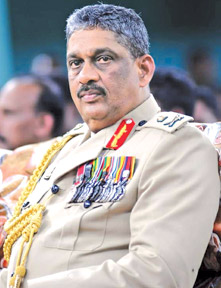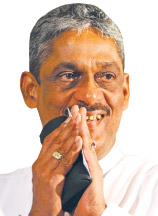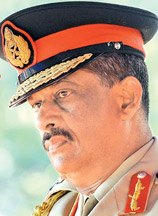A man like no other
Gardihewa Sarath Chandralal Fonseka, born on 18 December 1950 in the
southern coastal town of Ambalangoda may not have thought that he would
become such a great military man and politico who can recreate Sri
Lanka's history.
  Educated at Dharmashoka College, Ambalangoda and Ananda College,
Colombo his enrollment to the Sri Lanka Army on February 5, 1970 marked
the beginning of his military career. Educated at Dharmashoka College, Ambalangoda and Ananda College,
Colombo his enrollment to the Sri Lanka Army on February 5, 1970 marked
the beginning of his military career.
A military man who was born to take up any challenge joined the Sinha
Regiment of the Sri Lanka Army and passed every step through commitment
and sacrifice and rose to the highest echelons of the Sri Lanka Army in
December 2005 to become the Army Commander who rid the country of the
LTTE menace.
His challenging career as Army Commander urged the LTTE to send a
suicide bomber in the guise of a pregnant woman to Army headquarters on
April 25, 2006 to destroy him and remove him from the scene of the
battle against terrorism.
But his determination and courage never waned and the challenge he
took up to defeat the LTTE and make a comeback overcoming all the
injuries inflicted on him by the LTTE at a time when the LTTE challenged
the Sri Lankan Government triggering the Mavil Aru battle.
The start of the troops being victorious against the LTTE in August
2006 with the victory in Mavil Aru marked the beginning of the
victorious march to East, Wanni and the North.
He commanded the Army troops until he saw that the so-callled
invincible leader of the LTTE dead in the banks of the Nanthikadal
lagoon in Mullaitivu keeping his word that he will not handover the
problem of terrorism to his successor.
After the victory against the LTTE, in May 2009 he was promoted to
the rank of four star General along with other service commanders.
 Later he was promoted as the Chief of Defence Staff, a post that was
hurriedly created on 15 July 2009 by the Rajapaksa government to
accommodate him . Disagreements with the Rajapaksa government caused him
to retire from his military service on November, 12 2009. Later he was promoted as the Chief of Defence Staff, a post that was
hurriedly created on 15 July 2009 by the Rajapaksa government to
accommodate him . Disagreements with the Rajapaksa government caused him
to retire from his military service on November, 12 2009.
His retirement from the military service marked the beginning of a
second 'life' as a politician when he agreed with the common opposition
to contest the Presidential election as the rival of then President
Mahinda Rajapaksa.
Though the elections results was not in his favour, he fought back
relentlessly saying that the polls was rigged by the Rajapaksa regime.
This was the beginning of the revenge against him by the Rajapaksa
regime. Both the military law and he law of the country were set against
him and the Sri Lanka Army arrested Sarath Fonseka for committing
military offences on February 8 2010. Several law suits were filed
against him. He was court martialled and punished even under the regular
legal framework.
He was sentenced to 30 months after the court martial in 2010 which
convicted him of irregularities in army procurements. In August 2010, by
proclamation from President Mahinda Rajapaksa as Commander-in-Chief of
the armed forces he was cashiered from the army having been stripped of
his rank, medals and decorations. His military pension was forfeited.
On November 2011 Fonseka was sentenced to three years in jail and
fined Rs. 5000 in a two-one split verdict delivered in the white flag
case with two judges finding him guilty on one of the charges while one
of the judges acquitted him on all three charges.
The one time war hero was then sent to Welikada prison to spend his
jail term along with other prisoners under prisoner number 0-22032, an
action which angered a majority of Sri Lankans who believed that he was
the prime mover behind the victory against the LTTE.
 He led a hard time in prison while his wife Anoma Foneka a courageous
woman was fighting with the Rajapaksa regime to free him. He led a hard time in prison while his wife Anoma Foneka a courageous
woman was fighting with the Rajapaksa regime to free him.
However, Fonseka never bowed down to the conditions laid down by the
Rajapaksa regime for his release. Once his jail term came to an end
President Mahinda Rajapaksa signed the documents for Fonseka's release
in May 2012.
But his civic rights were annulled under Presidential proclamation
but Fonseka continued his political career as the leader of the
Democratic Party and fought back on the political platform to see the
end of the Rajapaksa regime.
He along with the common opposition reaped the efforts when common
opposition candidate Maitripala Sirisena emerged victorious at the
January 8, 2015 Presidential election defeating former president Mahinda
Rajapaksa.
Sarath Fonseka won the second biggest battle in his life on January
20, 2015, as President Maitripala Sirisena acquitted him of all charges
and restored his civic rights under a Presidential Amnesty.
Now he is on the threshold of becoming the first- ever Field Marshal
in the Sri Lankan military, as the present government is having
discussion to make him a five star general in recognition of his
services to the Sri Lankan military.
-Ranil |

